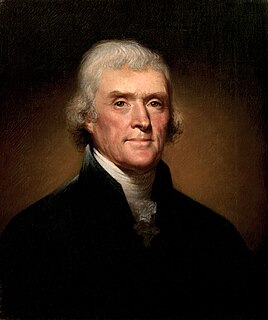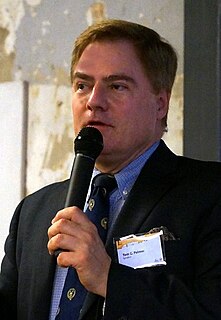Related Research Articles

The Virginia and Kentucky Resolutions were political statements drafted in 1798 and 1799 in which the Kentucky and Virginia legislatures took the position that the federal Alien and Sedition Acts were unconstitutional. The resolutions argued that the states had the right and the duty to declare unconstitutional those acts of Congress that the Constitution did not authorize. In doing so, they argued for states' rights and strict construction of the Constitution. The Kentucky and Virginia Resolutions of 1798 were written secretly by Vice President Thomas Jefferson and James Madison, respectively.
Civil liberties are guarantees and freedoms that governments commit not to abridge, either by constitution, legislation, or judicial interpretation, without due process. Though the scope of the term differs between countries, civil liberties may include the freedom of conscience, freedom of press, freedom of religion, freedom of expression, freedom of assembly, the right to security and liberty, freedom of speech, the right to privacy, the right to equal treatment under the law and due process, the right to a fair trial, and the right to life. Other civil liberties include the right to own property, the right to defend oneself, and the right to bodily integrity. Within the distinctions between civil liberties and other types of liberty, distinctions exist between positive liberty/positive rights and negative liberty/negative rights.

Lysander Spooner was an American individualist anarchist. He was also an abolitionist, entrepreneur, essayist, legal theorist, pamphletist, political philosopher, Unitarian, writer and a member of the International Workingmen's Association.

John Taylor, usually called John Taylor of Caroline, was a politician and writer. He served in the Virginia House of Delegates and in the United States Senate. He wrote several books on politics and agriculture. He was a Jeffersonian Republican and his works provided inspiration to the later states' rights and libertarian movements. Sheldon and Hill (2008) locate Taylor at the intersection of republicanism and classical liberalism. They see his position as a "combination of a concern with Lockean natural rights, freedom, and limited government along with a classical interest in strong citizen participation in rule to prevent concentrated power and wealth, political corruption, and financial manipulation" (p. 224).
Wealth, like suffrage, must be considerably distributed, to sustain a democratic republic; and hence, whatever draws a considerable proportion of either into a few hands, will destroy it. As power follows wealth, the majority must have wealth or lose power.
Freedom of association encompasses both an individual's right to join or leave groups voluntarily, the right of the group to take collective action to pursue the interests of its members, and the right of an association to accept or decline membership based on certain criteria. It can be described as the right of a person coming together with other individuals to collectively express, promote, pursue and/or defend common interests. Freedom of association is both an individual right and a collective right, guaranteed by all modern and democratic legal systems, including the United States Bill of Rights, article 11 of the European Convention on Human Rights, section 2 of the Canadian Charter of Rights and Freedoms, and international law, including articles 20 and 23 of the Universal Declaration of Human Rights and article 22 of International Covenant on Civil and Political Rights. The Declaration on Fundamental Principles and Rights at Work by the International Labour Organization also ensures these rights.

Randy Evan Barnett is an American legal scholar and lawyer. He serves as the Patrick Hotung Professor of Constitutional Law at Georgetown University, where he teaches constitutional law and contracts, and is the director of the Georgetown Center for the Constitution. After graduating from Northwestern University and Harvard Law School, he tried many felony cases as a prosecutor in the Cook County States’ Attorney's Office in Chicago. A recipient of a Guggenheim Fellowship in Constitutional Studies and the Bradley Prize, Barnett has been a visiting professor at Penn, Northwestern and Harvard Law School.
Lochner v. New York, 198 U.S. 45 (1905), was a landmark decision of the U.S. Supreme Court in which the Court ruled that a New York state law setting maximum working hours for bakers violated the bakers' right to freedom of contract under the Fourteenth Amendment to the U.S. Constitution. The decision has been effectively overturned.

Michael J. Badnarik is an American software engineer, political figure, and former radio talk show host. He was the Libertarian Party nominee for President of the United States in the 2004 elections, and placed fourth in the race, behind independent candidate Ralph Nader and the two major party candidates, George W. Bush and John Kerry. Two years later Badnarik ran as a Libertarian Party candidate in the 2006 congressional elections for Texas's 10th congressional district seat near Austin. In a three candidate field, Badnarik came in third, receiving 7,603 votes for 4.3% of the vote.

Restoring the Lost Constitution: The Presumption of Liberty is a 2003 book about the United States Constitution written by Randy Barnett, a professor of law at the Georgetown University Law Center. In the book, Barnett outlines his theory of constitutional legitimacy, interpretation, and construction. He argues that the Constitution should be interpreted by its "original meaning", distinct from the Founding Fathers' original intent.

Broadly speaking, liberty is the ability to do as one pleases, or a right or immunity enjoyed by prescription or by grant. It is a synonym for the word freedom. In modern politics, negative liberty is understood as the state of being free within society from control or oppressive restrictions imposed by authority on one's way of life, behavior, or political views. Whereas, positive liberty is understood as the possession of the power and resources to act in an environment that overcomes the inequalities that divide us.

Tom Gordon Palmer is an American libertarian author and theorist, a Senior Fellow at the Cato Institute and Vice President for International Programs at the Atlas Network.
In political philosophy, limited government is the concept of a government limited in power. It is a key concept in the history of liberalism.

Thomas Ernest Woods Jr. is an American author and libertarian commentator who is currently a senior fellow at the Mises Institute. Woods is a proponent of the Austrian School of economics. He hosts a daily podcast, The Tom Woods Show, and formerly co-hosted the weekly podcast Contra Krugman.
The law of equal liberty is the fundamental precept of liberalism and socialism. Stated in various ways by many thinkers, it can be summarized as the view that all persons must be granted the maximum possible freedom as long as that freedom does not interfere with the freedom of anyone else. While socialists have been hostile to liberalism, which is accused of "providing an ideological cover for the depredation of capitalism", scholars have stated that "the goals of liberalism are not so different from those of the socialists", although this similarity in goals has been described as being deceptive due to the different meanings liberalism and socialism give to liberty, equality and solidarity, including the meaning, implications and norms of equal liberty derived from it.
Libertarian conservatism, also referred to as conservative libertarianism and conservatarianism, is a political philosophy that combines conservatism and libertarianism, representing the libertarian wing of conservatism and vice versa.
Nullification, in United States constitutional history, is a legal theory that a state has the right to nullify, or invalidate, any federal laws which that state has deemed unconstitutional with respect to the United States Constitution. The theory of nullification has never been legally upheld by federal courts.
Constitutional economics is a research program in economics and constitutionalism that has been described as explaining the choice "of alternative sets of legal-institutional-constitutional rules that constrain the choices and activities of economic and political agents". This extends beyond the definition of "the economic analysis of constitutional law" and is distinct from explaining the choices of economic and political agents within those rules, a subject of orthodox economics. Instead, constitutional economics takes into account the impacts of political economic decisions as opposed to limiting its analysis to economic relationships as functions of the dynamics of distribution of marketable goods and services.
The Supremacy Clause of the Constitution of the United States establishes that the Constitution, federal laws made pursuant to it, and treaties made under its authority, constitute the "supreme Law of the Land", and thus take priority over any conflicting state laws. It provides that state courts are bound by, and state constitutions subordinate to, the supreme law. However, federal statutes and treaties must be within the parameters of the Constitution; that is, they must be pursuant to the federal government's enumerated powers, and not violate other constitutional limits on federal power, such as the Bill of Rights—of particular interest is the Tenth Amendment to the United States Constitution, which states that the federal government has only those powers delegated to it by the Constitution.
Bad Elk v. United States, 177 U.S. 529 (1900), was a United States Supreme Court case in which the Court held that an individual had the right to use force to resist an unlawful arrest and was entitled to a jury instruction to that effect.
Don Doig is the co-founder of the non-profit group Fully Informed Jury Association in Montana, which was set up to inform Americans about their rights as jurors as well as personal liberties. He was the national coordinator for the organization. He is associated with the Jefferson River Coalition. He is also a former Libertarian Party candidate. He also wrote He Who Pays the Piper: Federal Funding Of Research, and was an associate policy analyst at the Cato Institute.
References
- ↑ U.S. Constitution Teaching Theme, Teach-nology
- 1 2 "Meet the 'Patriots'". Southern Poverty Law Center . Retrieved 27 April 2018.
- ↑ "Jon Roland - Ballotpedia". Ballotpedia . Retrieved 27 April 2018.
- ↑ Weblaw Gateway to Australian Legal Resources. Link Archived 2009-09-19 at the Wayback Machine
- ↑ Calvin Johnson, Really Cool Stuff: Digital Searches into the Constitutional Period, 25 Const. Commentary 51 (Spring 2008). Link
- ↑ Cited as a research source in Robert Churchill, To Shake Their Guns in the Tyrant's Face, U. Michigan Press, 2009. ISBN 0472116827
- ↑ Discussion of nullification proposal of Jon Roland on the site by Thomas E. Woods, Jr., Nullification, Regnery, 2010, pp. 139-142. ISBN 9781596981492
- ↑ "constitution.org Competitive Analysis, Marketing Mix and Traffic - Alexa". Archived from the original on 2011-10-15. Retrieved 2011-04-13.
- ↑ The Higher Education Academy. Link Archived 2011-07-16 at the Wayback Machine
- ↑ "FACT CHECK: Do U.S. Citizens Have the Right to Resist 'Unlawful Arrest'?". Snopes.com. Retrieved 27 April 2018.